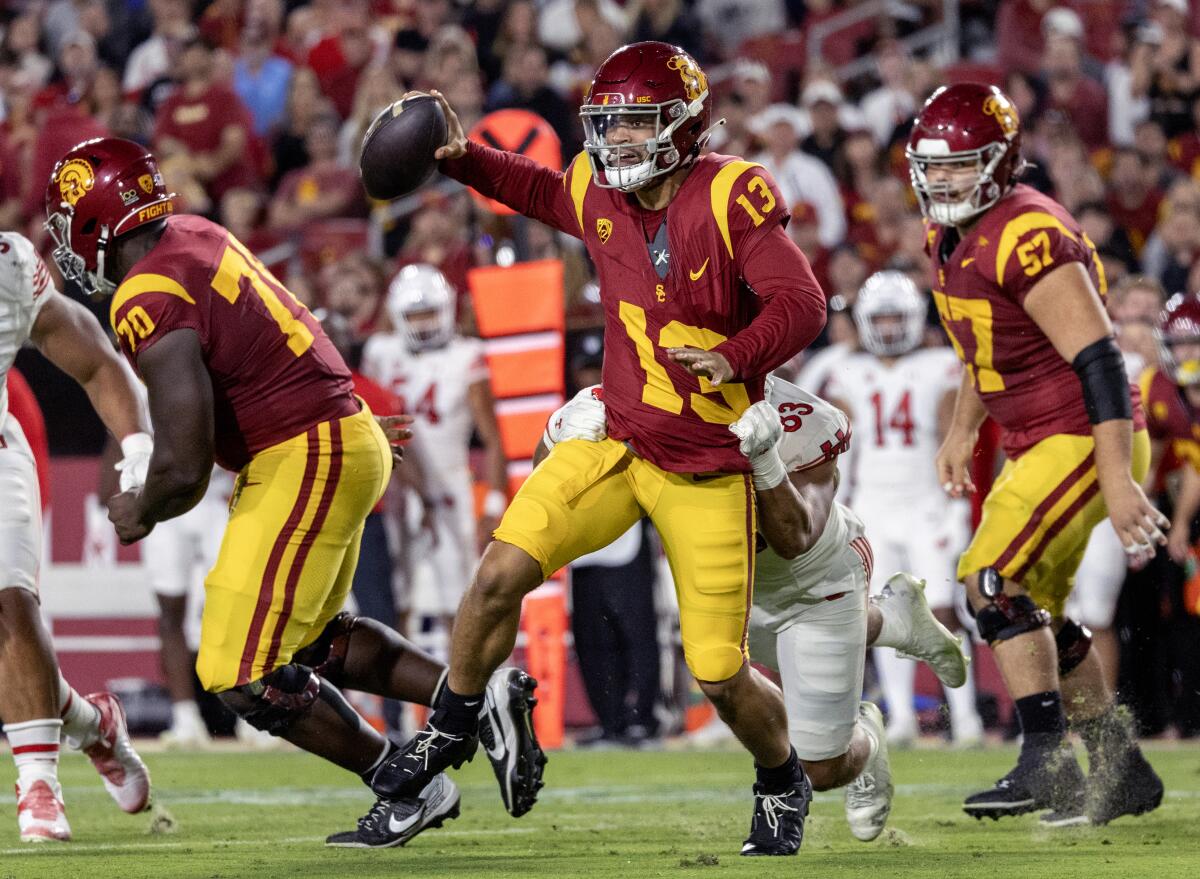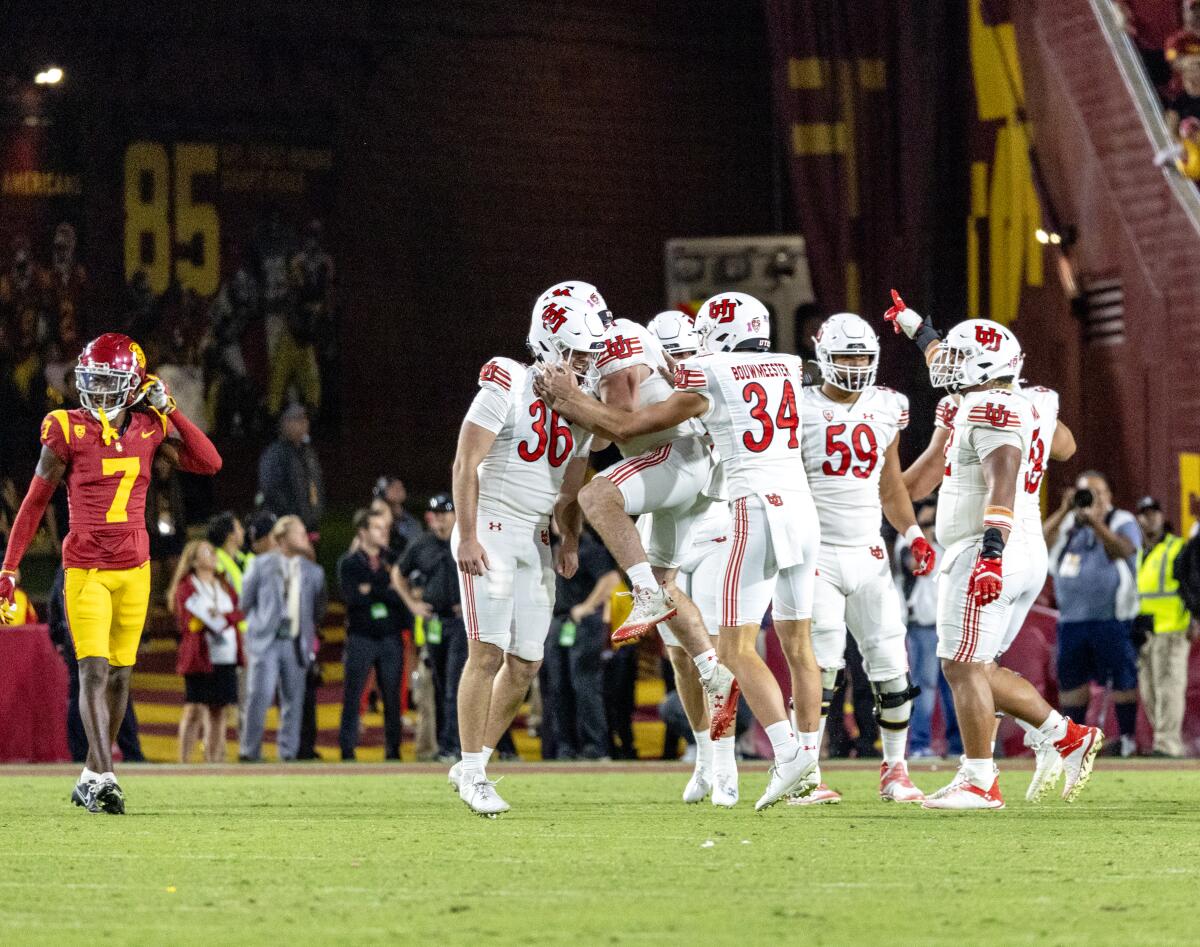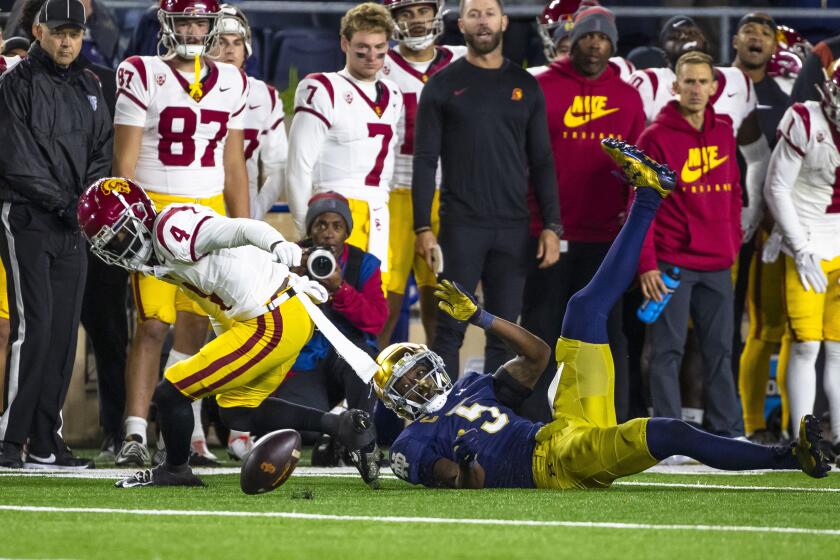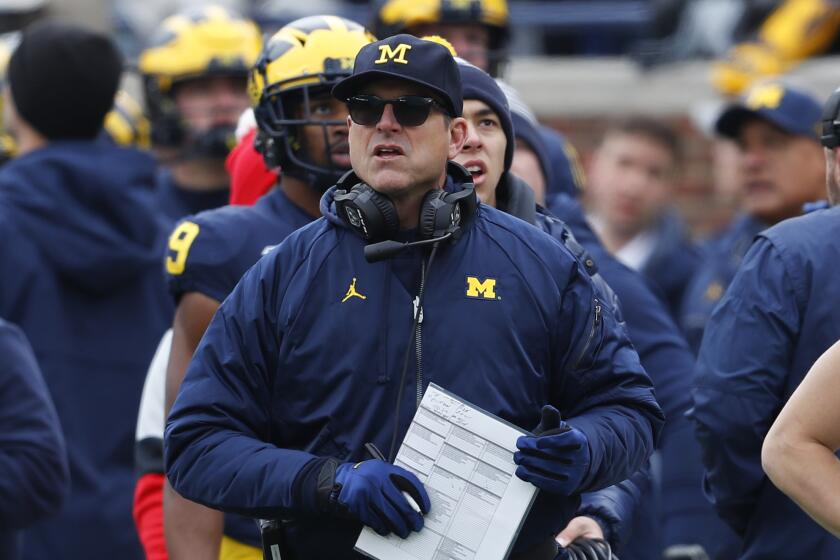With heartbreaking, last-second loss, USC falls to 0-3 vs. Utah in Lincoln Riley era

- Share via
It couldn’t possibly be happening again, could it? Not after last season. Not after last week.
Saturday night was supposed to be USC’s best shot for catharsis after two devastating defeats a season ago, its best chance to land a return punch on Utah, the team that punched the Trojans out of the Pac-12 title game and the College Football Playoff semifinals, the only Pac-12 team that had ever bested coach Lincoln Riley. Now the Utes were vulnerable to revenge, playing without star quarterback Cam Rising, who had authored USC’s demise, and without a functional offense for most of the season.
It defied explanation that it would happen again, but as Utah took a two-score lead into the fourth quarter Saturday, that familiar sort of slow-motion heartbreak that struck last season in Salt Lake City seemed to gurgle up from within.
USC fans need to forget about a quick path to a national championship and embrace the rebuilding project led by Lincoln Riley.
Boos had just rung out throughout the Coliseum, a stadium where Riley had yet to lose in two seasons. Considering the slide that started the previous Saturday in South Bend, the dread couldn’t help but creep in, seeping its way through a stunned stadium’s bleachers.
Then, suddenly, unexpectedly, a beacon of hope: Zachariah Branch, the electric freshman, caught a punt deep in Trojan territory with enough room to run and two minutes left to restore faith. He spotted a lane, sprinting 61 yards until he was forced out of bounds. A play later, Caleb Williams crossed into the end zone, stealing back a lead that seemed destined to stick.
But destiny, as USC was so rudely reminded Saturday night, could be a dangerous notion. It wouldn’t be long before it turned its back on the Trojans, dissolving into a 34-32 loss that once again derailed any hope of USC reaching the playoff.

“As gut-wrenching a defeat as I can remember in my career,” Riley said with a sigh.
Nothing that happened Saturday night, however, suggested that Riley or his Trojans belonged in any sort of championship conversation. USC’s offense struggled to move the ball for the better part of three quarters. Its defense struggled to get a stop when it needed one, giving up 482 yards. Williams, the reigning Heisman winner, was outdueled by Bryson Barnes, a backup who’d never passed for more than 175 yards in a game.
Barnes finished with 235 yards and three touchdowns — by far the best game of his college career — while Williams had 256 and was held without a passing score for the first time since he arrived at USC.
Even still, so many chances to right wrongs had been squandered, all the way up until the last 16 seconds.

It was then — on the 40-yard line, just outside of field-goal range — that the Utes seized hold of their fate while USC seemed to be asleep. It had taken plenty of mistakes to reach that point, starting with an ill-timed roughing the passer penalty from defensive lineman Bear Alexander that extended the drive. The final scramble, on second-and-15, only drove in the dagger. As Barnes took off, he sliced through the Trojans’ defense with ease until safety Bryson Shaw caught up to him at the 19-yard line. All Cole Becker had to do was hit a 38-yard field goal as time expired.
As he watched the kick split the uprights, Riley was shell shocked.
“I thought we had great calls,” Riley said. “I thought we had a ton of momentum.”
But USC had done little all day to capitalize on momentum. After rushing for 100 yards in the first quarter, the Trojans ran the ball just six times combined in the second and third. When its defense held strong on three consecutive drives before the half, USC’s offense moved just 68 yards over three drives. Twice, USC failed on key two-point conversions, and twice, it chose to kick a field goal in the fourth quarter rather than trying to extend drives.
“I had a couple of calls certainly I’d love to have back,” Riley said. “We had a couple of throws we’d love to have back, and it’s kind of — I don’t think any group was terrible, but everybody, including me, had a few mistakes, and you can’t make that against good teams. When we didn’t make them, we played well. But obviously, that’s got to be better.”
Like a lot of teams, Michigan has benefited from stolen signs, but will the NCAA find the program went beyond the accepted methods of decoding signs?
USC’s issues seemed to run deeper than Saturday — and last Saturday, too, for that matter. Whether there’s actually time now, midway through the season, to uncover their root cause remains to be seen.
“We’re kind of in one of those tough stretches that you gotta go dig yourself out of,” Riley said. “This is when you get tested as a program. This is when you get tested as a coach and a leader.”
Those tests were already well underway Saturday, whether Riley wanted to admit it or not. And once again, up against the class of the Pac-12 in defending champions Utah, Riley and the Trojans fell short of expectations. Even if the coach preferred to move the goalposts in that regard.
“I still know that there’s a lot out there for this team, even though some people will count us out,” Riley said. “That’s OK. There’s a lot left for this team.”
More to Read
Go beyond the scoreboard
Get the latest on L.A.'s teams in the daily Sports Report newsletter.
You may occasionally receive promotional content from the Los Angeles Times.









